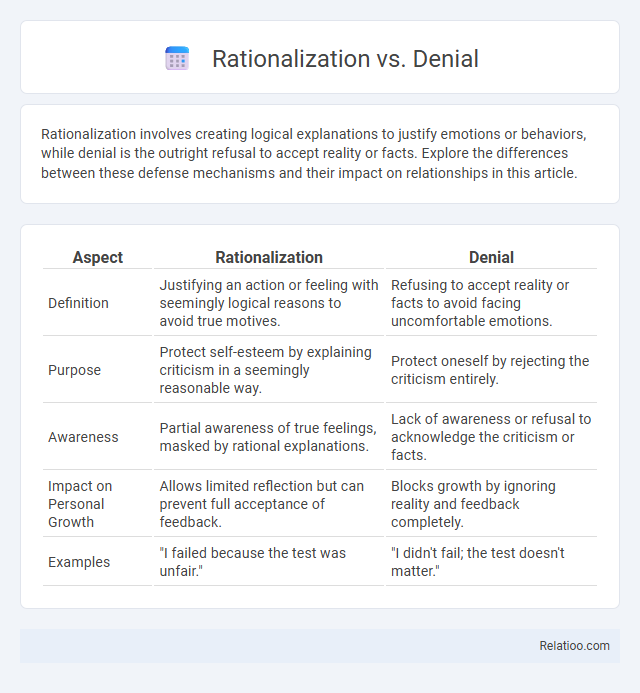Rationalization involves creating logical explanations to justify emotions or behaviors, while denial is the outright refusal to accept reality or facts. Explore the differences between these defense mechanisms and their impact on relationships in this article.
Table of Comparison
| Aspect | Rationalization | Denial |
|---|---|---|
| Definition | Justifying an action or feeling with seemingly logical reasons to avoid true motives. | Refusing to accept reality or facts to avoid facing uncomfortable emotions. |
| Purpose | Protect self-esteem by explaining criticism in a seemingly reasonable way. | Protect oneself by rejecting the criticism entirely. |
| Awareness | Partial awareness of true feelings, masked by rational explanations. | Lack of awareness or refusal to acknowledge the criticism or facts. |
| Impact on Personal Growth | Allows limited reflection but can prevent full acceptance of feedback. | Blocks growth by ignoring reality and feedback completely. |
| Examples | "I failed because the test was unfair." | "I didn't fail; the test doesn't matter." |
Understanding Rationalization and Denial
Rationalization involves creating logical explanations to justify behaviors or feelings that are unacceptable, often distorting reality to reduce psychological discomfort. Denial, on the other hand, is a defense mechanism where an individual refuses to acknowledge the existence of distressing facts or emotions altogether. Understanding these mechanisms is crucial for recognizing how people cope differently with stress and internal conflict.
Defining Rationalization: Meaning and Examples
Rationalization is a defense mechanism where an individual justifies or explains behaviors, decisions, or feelings with seemingly logical reasons, avoiding the true underlying motives. Unlike denial, which involves refusing to accept reality, rationalization masks the real reasons behind actions by creating acceptable explanations, such as blaming external factors for personal failures. You can see examples of rationalization when someone fails an exam but insists it was due to unfair questions rather than lack of preparation.
What Is Denial? Key Characteristics
Denial is a psychological defense mechanism where an individual refuses to accept reality or facts, protecting themselves from uncomfortable emotions or truths. Key characteristics of denial include ignoring obvious evidence, minimizing the severity of a situation, and rejecting external information that contradicts personal beliefs. Your ability to recognize denial can improve emotional resilience and foster healthier coping strategies.
Psychological Roots of Rationalization
Rationalization originates in the unconscious mind as a defense mechanism to protect Your self-esteem by creating logical explanations for irrational or unacceptable behaviors and feelings. Unlike denial, which outright rejects reality, rationalization attempts to make sense of emotions or actions by altering perception rather than reality. Deep psychological roots tie rationalization to internal conflicts and the need to reduce cognitive dissonance by justifying or explaining away uncomfortable truths.
Denial: Defense Mechanism in Action
Denial serves as a powerful defense mechanism where individuals refuse to accept reality, thus protecting themselves from painful truths or emotions. Unlike rationalization, which justifies behaviors or feelings with seemingly logical explanations, denial outright rejects the existence of distressing facts. This psychological strategy helps reduce anxiety by blocking external events from awareness, though prolonged denial can hinder emotional growth and problem-solving.
Comparing Rationalization vs Denial
Rationalization involves creating logical explanations to justify unacceptable feelings or behaviors, while denial is the complete refusal to acknowledge reality or facts. Your ability to recognize rationalization helps you confront uncomfortable truths, whereas denial blocks self-awareness by ignoring evidence. Understanding the distinction enhances emotional intelligence and promotes healthier coping mechanisms.
Impact on Mental Health and Behavior
Rationalization, denial, and repression each significantly impact mental health and behavior by shaping how individuals cope with stress and trauma. Rationalization allows individuals to justify actions or feelings with logical explanations, potentially reducing anxiety but sometimes preventing genuine emotional processing. Denial involves rejecting reality to avoid distress, which can lead to unresolved issues and hinder emotional growth, while repression unconsciously blocks painful memories or feelings, often resulting in suppressed emotions that affect long-term psychological well-being.
Common Situations Where They Occur
Rationalization often occurs when individuals justify controversial behaviors or feelings to avoid guilt, such as a student blaming a failed exam on poor teaching instead of lack of preparation. Denial is common in situations involving trauma or loss, where a person refuses to accept reality, like a smoker dismissing health warnings despite medical evidence. Projection frequently appears in interpersonal conflicts, for example, when someone accuses others of hostility while harboring aggressive feelings themselves.
Strategies to Overcome Rationalization and Denial
Overcoming rationalization and denial requires conscious self-awareness and cognitive restructuring strategies, such as acknowledging uncomfortable truths and challenging distorted thoughts. Techniques like mindfulness meditation and therapy-based approaches, including cognitive-behavioral therapy (CBT), support individuals in confronting reality without avoidance. Building emotional resilience and fostering open communication enhance the ability to accept facts and reduce reliance on defense mechanisms like rationalization and denial.
The Importance of Awareness and Self-Reflection
Awareness and self-reflection are crucial in distinguishing rationalization from denial, as both are defense mechanisms but serve different psychological purposes. Rationalization involves creating logical explanations to justify behaviors or feelings, while denial outright rejects reality to avoid uncomfortable truths. Cultivating mindfulness allows individuals to recognize these patterns, promoting emotional growth and healthier coping strategies.

Infographic: Rationalization vs Denial
 relatioo.com
relatioo.com